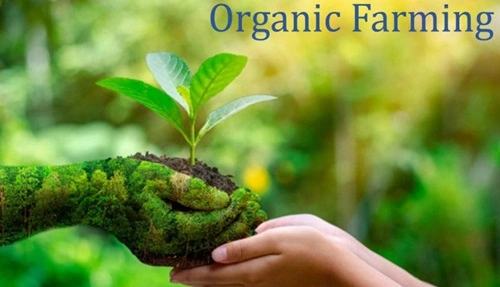See, literally everybody in India that knows about farming, is concerned about how much the chemical use is growing in the traditional way of farming right here in India. That’s not good for the general public, and you’d certainly agree with that. Though, then there comes something like Organic Farming which is again using natural processes as well as resources to grow crops, and it has become kinda super famous. But there are certainly things you should know about Organic Farming as of 2025, and that’s precisely why we have come up with the SWOT analysis of organic farming in India as of 2025, so, let’s just get to it then.

Strengths of Organic Farming in India
1. There Are Literally So Many Farmers In India ALREADY!
India has a staggering number of farmers who are practising organic farming, which is working in the favor of the nation as a whole. Like, the year 2020 saw more than 1.9 million farmers practising organic farming, and it is expected that this number will rise even more by 2025. So yes, ultimately that’s a super good thing right there.
2. It’s True That India Has Kinda Perfect Weather for All the Crops
India has a mixed type of climate including warm, rainy, and cool that is perfect for a wide range of crops. This variable weather is beneficial for the production of organic products from mangoes to turmeric, which is a reason why the country can grow diverse crops.
3. Has Government Backing Things Up
It is true that right here in India, the government supports organic farming. For example, as of 2025, the Indian government uses plans such as PKVY that are working super well actually. Like, this plan gives money along with teaching to farmers. And just so you know, with these efforts, it looks like they want to enlarge organic farmland by 6 lakh hectares by 2025-26. All in all, yes, the plan offers funds plus help.
4. Everyone Wants Organic Now, Right?
You see, in India worldwide, individuals pick healthy eating. Just to give you perspective on things, like, in 2023 the organic food market reached $1.7 billion, and experts say it may reach $10 billion by 2032, which is just purely impressive if you think about it for a sec. This fact shows many pay more for food that boosts their health while also helping nature.
Weaknesses of Organic Farming in India
1. Buyers Will Always Be There? Not Sure Actually!
See, there is no guarantee that the buyers will always buy what you grow or produce, like, farmers grow good organic tomatoes but buyers do not always come. And that’s how they lack a steady marketplace, which makes it hard to earn money. This result harms their work.
2. Problems with Certification
What? Well, you see, farmers need a certificate to claim produce is organic. And surely, right here in India, the certificate costs money and proves hard to get. What then? Well, small farmers suffer the impact, and many opt not to change to organic methods.
3. Heavy Manual Work And That’s How It Is
Oh, this one’s kinda real, you see, organic farming requires work done by hand without machines or artificial products. Farmers pull weeds on foot and mix compost, which sounds easy but it isn’t really. The extra work makes costs rise, many cannot handle it.
4. No Proper Training
Training? Oh yes! You see, farmers in remote regions do not get enough guidance on organic methods. They start without proper instructions, which makes success harder.
5. Usually, It Is High Cost of Natural Products
See, these days, natural fertilizers and pest controls cost more than chemical options, so it’s not always easy to go natural all the time. The higher price forces farmers to pay extra for better quality.
Opportunities For Organic Farming in India
1. This Segment Is Just Growing Kinda Fast
More people want organic products these days and that’s a no-hidden secret, right? And so no wonder why experts think that by 2025 the local market might reach 64 billion rupees, while exports could rise to 20,000 crore soon, and if you think about this number, that’s just purely mind-boggling stuff right there. More customers give farmers more income, simple as that!
2. Higher Prices, Greater Returns, Simple As That!
Organic items fetch higher prices, no doubt, so farmers get more money on each sale, and that’s ultimately a good thing for the organic farming scene of the country. Like, buyers choose healthy natural produce, which brings better profit, and it should keep on going like this.
3. Organic Farming + Green Future, How About That?
Greener future? Oh, why not? Like, organic farming does less harm to nature, keeps soil in good shape along with cuts overall damage, so we ask again, why not? You know like, this method helps the earth while drawing support from environmental groups plus extra funds.
4. Kinda Good Use Of Technology At This Point
Do you think that farmers usually go old school all the time? Well, not really, you see, new tools such as modern sprayers and crop-tracking apps, make organic farming easier while reducing costs, and that’s what these farmers are using these days.
Threats To The Organic Farming in India
1. In A Way, Conventional Farming Outpaces Organic
Traditional farming that uses chemicals tends to cost less and proceed faster, and that’s a threat right there. Yes, it is, because this may lead some farmers to stop organic practices in favour of conventional methods, and what happens next? Like, it works like choosing a quicker way even if quality drops.
2. Pests and Diseases Are BAD NEWS!
How hard is it? Well, you see, without chemical help pest problems and plant illnesses can cause big setbacks, like the entire field of some crop will be gone in no time. And when something like this happens, the farmers do have not a lot of options, which is pretty sad if you ask us.
3. You Can’t Just Predict Weather Patterns
Weather changes including drought, flood, and extreme heat, create a steady risk for farmers, but since organic farming is expensive, the financial risk is kinda huge here. Since organic crops depend on nature, bad weather may easily and kinda swiftly lead to large losses.
4. People Are Tricking Customers In The Name of ORGANIC
Some dishonest sellers call non-organic items organic, tricking buyers, and that is damaging the reputation of this entire organic farming scene as a whole. If there is no trust among customers, how will this sector survive then?





